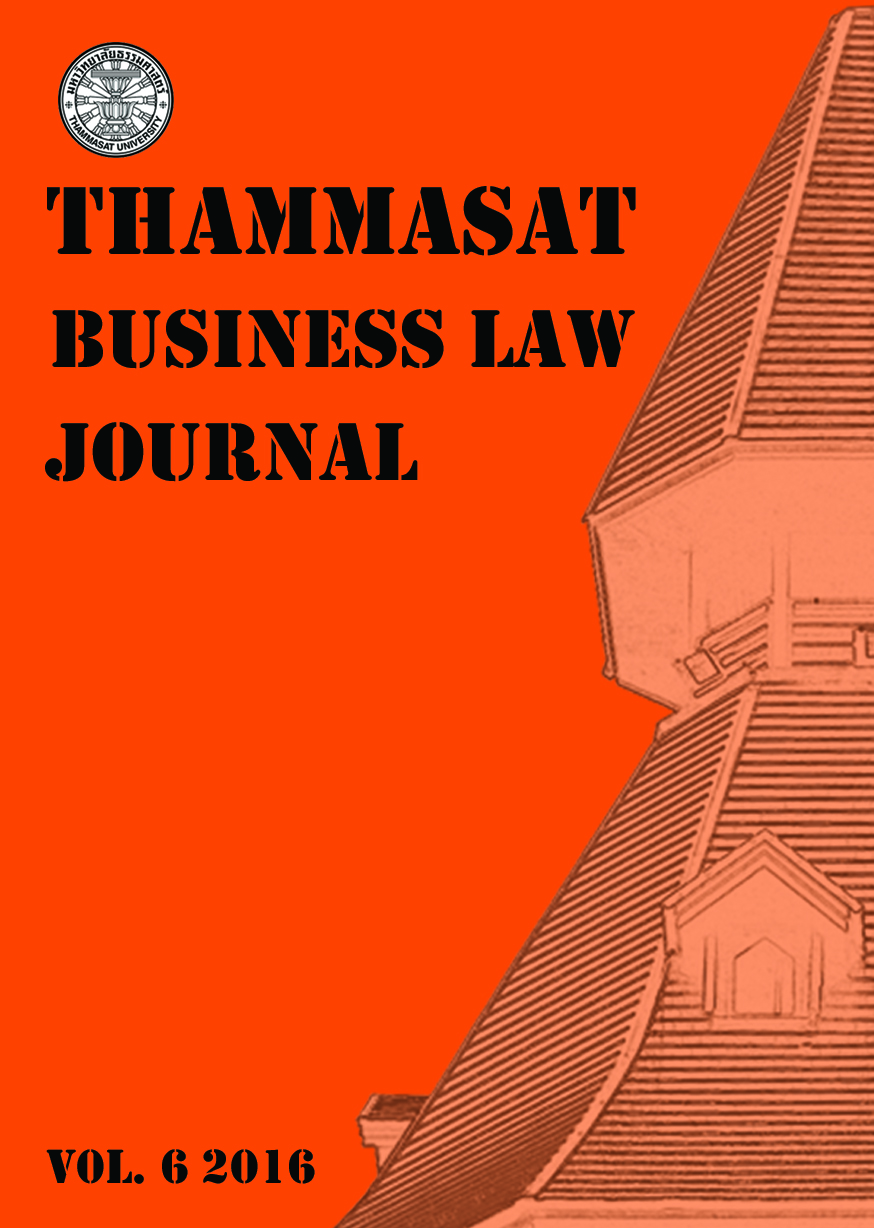The Significance of Regulating Virtual Currency Service Businesses in Thailand
Main Article Content
Abstract
Traditional financial models and businesses are disrupted by the integration of finance and technology or financial technologies. Virtual currency is a product of financial technologies. It has been developed and increasingly used as alternative mean of payment. Bitcoin is the most popular decentralized virtual currency which being used as medium of exchange for goods and services and also exchanged for legal currencies including Thai Baht. The price value of Bitcoin is determined by demand and supply which can change easily. That is where people find an opportunity for investment or speculation similar to those stocks and other securities. The reasons behind Bitcoin popularity include a number of benefits. User’s privacy remains undisclosed and transactions can be done without relying on third party like financial institutions. Additionally, Bitcoin transactions are quick, cheap and irreversible. Unfortunately, it has been taken advantages by criminals and money launderers. They sometimes use virtual currency to perform illicit activities such as illegal trading, dirty money launderings, fraud, cybercrimes and tax evasion. Likely, virtual currency service businesses which administering or exchanging virtual currencies for Baht or other virtual currencies are found with potential to facilitate those illicit activities.
It has been arguing what virtual currency like Bitcoin is under the existing laws in foreign countries and Thailand. The questions of legal currency, foreign currency, electronic money, securities, commodity and property have been discussed. It is also a concern how virtual currency service businesses should properly be regulated in order to manage the potential risks while avoid the over-regulation. United States is a country which actively responds to those issues. Though regulators and courts find it is possible to apply the existing laws to virtual currency and the related businesses, they are aware of the significant difference between financial technologies and traditional financial businesses. United States regulators instead develop the new regulations to ensure putting in place guardrails that protect consumers and rooting out illicit activity without stifling beneficial innovation.
Accordingly, this thesis explores the approaches to regulate virtual currency and the related businesses properly. Fundamentally, the approaches are based on Thai existing laws. The regulatory developments in United States shall essentially be guidelines to provide the appropriate recommendations for Thailand’s regulations. In conclusion, this thesis proposes that virtual currency and virtual currency services business should be, on a timely basis, regulated under the securities regulations. In order to do so, the Securities and Exchange Commission should issue the regulations to specify virtual currency as securities and to establish the licensing regime to regulate the conduct of virtual currency service businesses appropriately. The regulations are proposed to help reduce the incentive for criminals, money launderers and tax evaders using virtual currency services business to facilitate illegal purposes. This licensing regime will ensure that consumers are treated properly and will also mitigate cyber-attack risks of this business.
Article Details
References
Kien-Meng Ly, Matthew. “COINING BITCOIN’S “LEGAL-BITS”: EXAMINING THE REGULATORY FRAMEWORK FOR BITCOIN AND VIRTUAL CURRENCIES.” Harvard Journal of Law & Technology 27, no. 2 Spring 2014 (2014).
UK Government Chief Scientific Adviser. “FinTech Futures.” (2015). https://www.gov.uk/government/uploads/system/uploads/attachment_data/file/413095/gs-15-3-fintech-futures.pdf, Accessed October 3, 2015.
United States Government Accountability Office. “Report To The Committee On Finance, U.S. Senate : Virtual Economies And Currencies.” (2013). http://www.gao.gov/assets/660/654620.pdf, Accessed December 29, 2014.
Bitcoin.org. “FAQ - Bitcoin.” (Last modified 2015). https://bitcoin.org/en/faq#why-do-bitcoins-have-value, Accessed May 5, 2015.
Bitcoincharts.com. “Bitcoin Charts.” (Last modified 2015). http://bitcoincharts.com/, Accessed May 1, 2015.
Cftc.gov. “Testimony Of Chairman Timothy Massad Before The U.S. Senate Committee On Agriculture, Nutrition & Forestry.” (Last modified 2015.) http://www.cftc.gov/PressRoom/SpeechesTestimony/opamassad-6, Accessed October 3, 2015.
Csbs.org. “Model Regulatory Framework.” (Last modified 2015). https://www.csbs.
org/regulatory/ep/pages/framework.aspx, Accessed October 3, 2015.
Dfs.ny.gov. “Speech - June 3, 2015: NYDFS Announces Final Bitlicense Framework For Regulating Digital Currency Firms.” (Last modified 2015). http://www.
dfs.ny.gov/about/speeches/sp1506031.htm, Accessed October 3, 2015.
Irs.gov. “IRS Virtual Currency Guidance : Virtual Currency Is Treated As Property For U.S. Federal Tax Purposes; General Rules For Property Transactions Apply.” (Last modified 2015). http://www.irs.gov/uac/Newsroom/IRS-Virtual-Currency-Guidance, Accessed October 3, 2015.
Leginfo.legislature.ca.gov. “Bill Analysis.” (Last modified 2015). http://leginfo.
legislature.ca.gov/faces/billAnalysisClient.xhtml, Accessed April 5, 2015.
European Central Bank. “Virtual Currency Schemes.” Frankfurt am Main. (2012). http://www.ecb.europa.eu/pub/pdf/other/virtualcurrencyschemes201210en.pdf, Accessed December 28, 2014.
Nakamoto, Satoshi. “Bitcoin: A Peer-To-Peer Electronic Cash System.” 1st ed. (2008). http://bitcoin.org/bitcoin.pdf, Accessed December 26, 2014.


